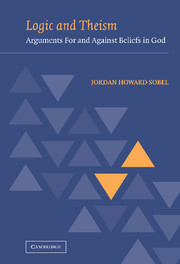Book contents
- Frontmatter
- Contents
- Preface
- DIVINITY
- ARGUMENTS FOR THE EXISTENCE OF GOD
- II Classical Ontological Arguments
- III Modern Modal Ontological Arguments
- IV Kurt Gödel's Ontologischer Beweis
- V First Causes “The Second Way”
- VI Ultimate Reasons: Proofs a contingentia mundi
- VII Look ’Round! – Arguments from Design
- VIII Clouds of Witnesses – “Of Miracles”
- ON TWO PARTS OF THE COMMON CONCEPTION
- ARGUMENTS AGAINST THE EXISTENCE OF GOD
- PRACTICAL ARGUMENTS FOR AND AGAINST THEISTIC BELIEFS
- Notes
- References
- Index of Names
VII - Look ’Round! – Arguments from Design
Published online by Cambridge University Press: 28 July 2009
- Frontmatter
- Contents
- Preface
- DIVINITY
- ARGUMENTS FOR THE EXISTENCE OF GOD
- II Classical Ontological Arguments
- III Modern Modal Ontological Arguments
- IV Kurt Gödel's Ontologischer Beweis
- V First Causes “The Second Way”
- VI Ultimate Reasons: Proofs a contingentia mundi
- VII Look ’Round! – Arguments from Design
- VIII Clouds of Witnesses – “Of Miracles”
- ON TWO PARTS OF THE COMMON CONCEPTION
- ARGUMENTS AGAINST THE EXISTENCE OF GOD
- PRACTICAL ARGUMENTS FOR AND AGAINST THEISTIC BELIEFS
- Notes
- References
- Index of Names
Summary
Poems are made by fools like me,
But only God can make a tree.
Joyce KilmerWhat had that flower to do with being white,
The wayside blue and innocent heal-all?
What brought the kindred spider to that height,
Then steered the white moth thither in the night?
What but design of darkness to appall?–
If design govern in a thing so small.
Robert FrostDavid Hume's great book, Dialogues Concerning Natural Religion, is a fictional report, by Pamphilus to Hermippus, of a conversation of his tutor, Cleanthes, with Demea and Philo on matters pertaining to religion. The main subject is a certain argument, a teleological argument, for the existence of God. Hume's masterfully orchestrated examination of this argument ends with a long rhetorical question and summing up by Philo, who holds that far less than Cleanthes sought can be concluded from facts of apparent design in nature, but that some sort of designer-deity, albeit not a humanly relevant one, can be reasonably inferred. Demea withdraws from the conversation after Philo has drawn it through facts of apparently unnecessary evil and before Cleanthes and Philo have given final statements of their positions, which agree on some points and disagree on others.
Section 1 to follow states the argument, considers its character, and compares it with cosmological arguments. Section 2 dispatches a certain radical objection to the argument and notes several factors relevant to its assessment. Precise Bayesian explications of these factors are developed in Sections 3 and 4.
- Type
- Chapter
- Information
- Logic and TheismArguments for and against Beliefs in God, pp. 238 - 297Publisher: Cambridge University PressPrint publication year: 2003



